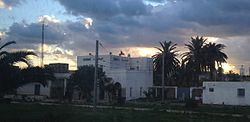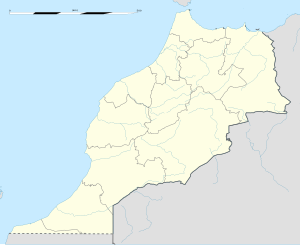Skhirat
|
Skhirat الصخيرات (Arabic) ⵙⵅⵉⵕⴰⵜ (Berber) |
|
|---|---|
 |
|
| Location in Morocco | |
| Coordinates: 33°51′0″N 7°01′48″W / 33.85000°N 7.03000°W | |
| Country |
|
| Region | Rabat-Salé-Kénitra |
| Area | |
| • Total | 17 sq mi (45 km2) |
| Population (2004) | |
| • Total | 43,025 |
| Time zone | GMT (UTC+0) |
| • Summer (DST) | GMT (UTC+1) |
| Area code(s) | 12050 |
Skhirat (Arabic: الصخيرات; Berber: ⵙⵅⵉⵕⴰⵜ; Spanish: Sjirat) is a small seaside town situated between the administrative capital Rabat and the economic capital Casablanca, known within Morocco for its idyllic beaches on the edge of the Atlantic Ocean.
Within the past decade it has steadily developed; especially with high class beach properties.
Life in Skhirat is distinguished between the rural population living from agricultural products, the agile municipal town center and the ocean site, where an authentic small harbour provides work for many fisherman.
The main beach, right beside the summer palace of the Moroccan King is a well-known spot for vacationers and weekend retreat for visitors from the capital Rabat. It has become a key rallying point for surfers from the whole region.
Two associations (Associations de Surf Skhirat Plage and Association des Jeunes Surfeurs de Skhirat) offer surf courses for all levels. They are located directly beside the beautiful "L'Amphitrite Palace Resort and Spa."
This luxury hotel offers a private beach, first-class comfort and a great relaxing atmosphere, appreciated by vacationers as well as international business travellers, because of its proximity to the CIC Mohammed VI (Le Centre Internationale des Conferences Mohammed VI).
CIC Mohamed VI is one of the largest convention centers in North Africa, located at Skhirat beach. It recently hosted the ceremony dedicated to the signature of the political agreement to form a Libyan national unity government, dated December 17, 2015.
Also located in Skhirat is the summer palace of the Moroccan King Mohammed VI, venue of a failed military coup against King Hassan II in July 1971, organised by General Medbouh and M'hamed Ababou.
...
Wikipedia

